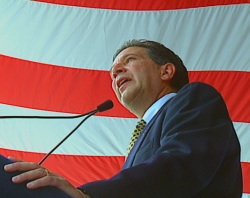"[S]enate Republicans should pass the S. 472 legislative initiative that provides for Puerto Rico self-determination and that every Republican president since Dwight Eisenhower has supported."
"It is altogether fitting that the Republican majority in the 105th Congress, under the leadership of Senator Frank Murkowski and Representative Don Young, should be establishing the framework and the mechanism for the 3.8 million American citizens of Puerto Rico to freely exercise their right of political self-determination and to finally resolve their future relationship with the United States.
"After all, the National Republican Party and the Republican Party in Puerto Rico have a long and close relationship, both sharing a rich tradition and commitment to the principles for which our party stands and for the right of Puerto Rico's residents to become fully self-governing as either an independent nation or as the fifty-first state in our glorious Union." Zoraida Fonalledas, Republican National Committeewoman For Puerto Rico
|
WASHINGTON, July 23 -- The Democratic Governor of Puerto Rico, pushing for a chance for his island to vote for statehood, has come up with a tempting sales pitch for the Republican-controlled Congress.
Imagine a place, Gov. Pedro J. Rossello and his lobbyists say, that opposes abortion, hands out vouchers so children can attend parochial schools, has sliced capital gains taxes, allows school pupils five minutes for prayer, and is busy privatizing many of its major industries. The place, they add, hoping to clinch the deal, is Puerto Rico.
''Puerto Rico passed the 'Contract With America,' '' said an important backer in Congress, Senator Larry E. Craig, and it is a point that the Idaho Republican never fails to make to incredulous colleagues as he pushes his legislation for a Congressionally sanctioned referendum on Puerto Rico's status. Lizette Alvarez, The New York Times, 7/24/98
The large and important burden of removing the asterisk from the American citizenship of residents of Puerto Rico now rests on the Senate. One hundred years after the imperial fact, it is past time to repudiate a colonial-type system that denies Puerto Ricans full vote and voice in national law-making and much else. The Washington Post, Editorial, 8/04/98
Puerto Rico is going to hold another referendum on the question of statehood, but the nonbinding plebiscite isn't what it really needs. What the island needs is Senate approval of a House-passed bill that would allow the island to decide for real whether it wants to be a state. Unfortunately, the Senate doesn't seem much interested. Newsday, Editorial, 8/03/98
Puerto Ricans should have the chance to vote in a binding referendum, but unless the Senate surprises everyone by acting responsibly, it looks like Rossello's straw vote will have to do for now. Perhaps it will lead to a real choice for Puerto Ricans. Sun-Sentinel, Editorial, 7/30/98
The bill that passed the House several months ago was straightforward and should not require much tinkering. Any further delay or watering down of this bill would be unwarranted. The Hartford Courant, Editorial, 7/24/98
U.S. Senate Majority Leader Trent Lott says there's not enough time to consider the issue of Puerto Rico's status before senators head home in October.
Mr. Lott should reconsider. His position, which places him between Puerto Ricans and self-determination, creates ill will and delays an overdue decision. Orlando Sentinel, Editorial, 7/19/98
|

"To those who fervently profess that Puerto Rico cannot be a state, we today affirm that Puerto Rico shall indeed become the 51st state of the U.S.A." Governor Pedro Rossello
"Several states, beginning with Tennessee in 1796, chose a bold method of obtaining admission to the union. The 'Tennessee Plan' consists of the following steps: 1) Unsuccessfully petitioning Congress for admission; 2) Drafting a state constitution without prior congressional intervention; 3) Holding state elections for state officers, U.S. Senators and Representatives; 4) In some cases, sending the entire congressional delegation to Washington to demand statehood and claim their seats; 5) Finally, Congress, presented with a fait accompli, has little choice but to admit a new state through the passage of a simple act of admission." Osceola Sentinel, 7/31/98
"100 years ago, on July 25th, the U.S. acquired Puerto Rico a part of the treaty that ended the Spanish-American War. Today Puerto Rico is poised for another major political shake-up. A bill, which the House has approved, would allow Puerto Rico to vote on its destiny: statehood, independence, or stay a commonwealth." Talk of the Nation, NPR
"Arguments on questions of statehood, independence or commonwealth status don't have simple answers." Roger Hernandez, Portland Oregonian, 7/31/98
Resolving Puerto Rico's Political Status
The record before Congress is now clear that permanent union and irrevocable U.S. citizenship can not be obtained through commonwealth, even if it is reformed as proposed in the 1993 commonwealth definition. Since only statehood provides the constitutionally guaranteed status and citizenship included in the commonwealth definition, the real question arising from the 1993 referendum results is how those who voted for commonwealth with permanent union and irrevocable U.S. citizenship intend to achieve that result if not through statehood.
"We will be repeating the mistakes of 1952 if we do not inform the people of Puerto Rico that individual U.S. citizenship is protected under commonwealth for the individual to whom it is already granted against arbitrary loss, regulation or restriction, but that the conferral of U.S. citizenship in the future is discretionary and could be withdrawn."
Recent Commentary from Puerto Rico
Miriam Ramirez de Ferrer, Neftali Fuster, Guillermo Moscoso, Robert Becker
|

